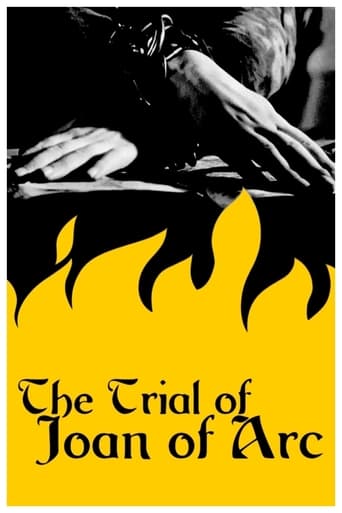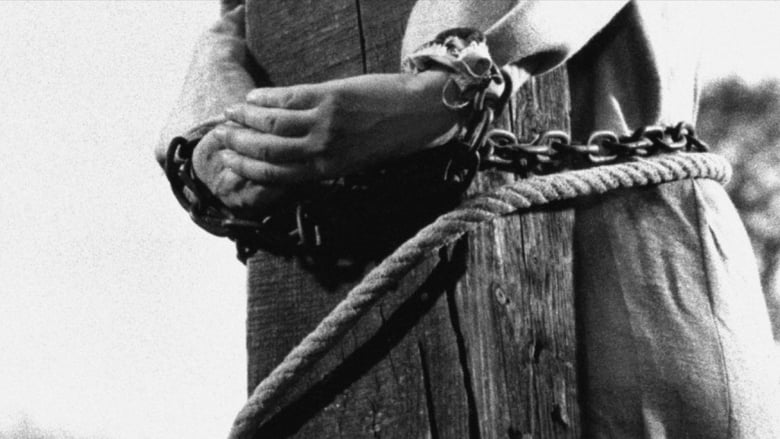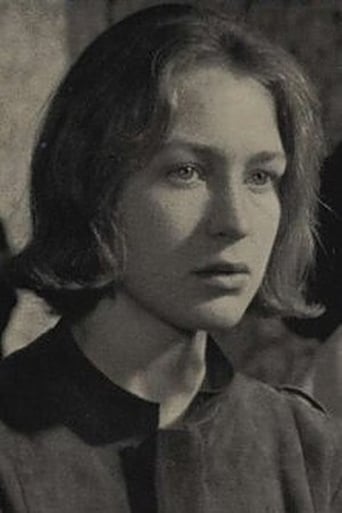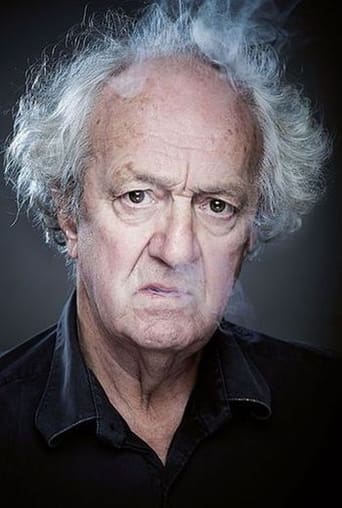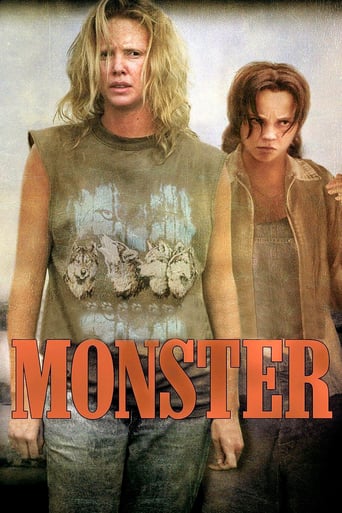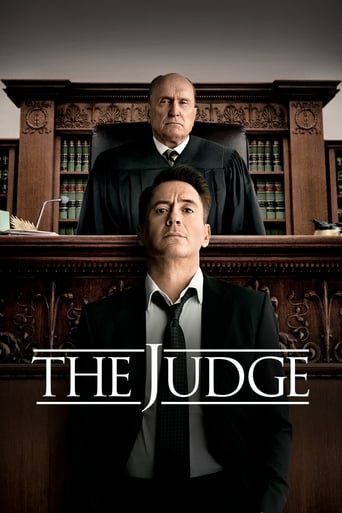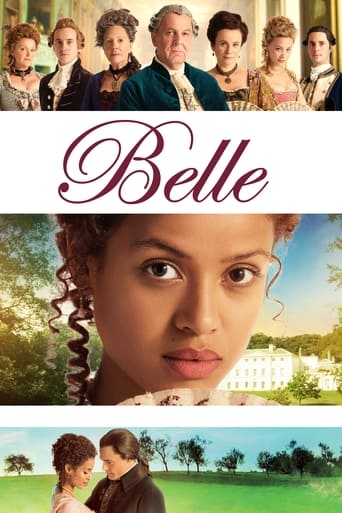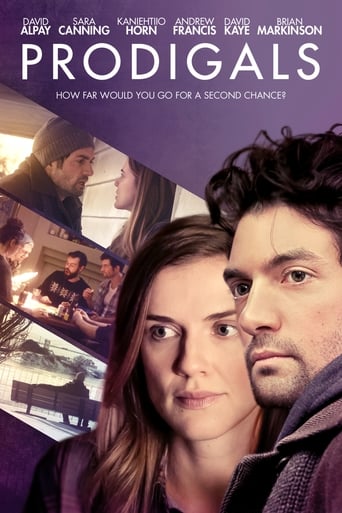The Trial of Joan of Arc (1963)
Rouen, Normandy, 1431, during the Hundred Years' War. After being captured by French soldiers from an opposing faction, Joan of Arc, the Maid of Orléans, is unjustly tried by an ecclesiastical court overseen by her English enemies.
Watch Trailer
Cast


Similar titles
Reviews
Pretty good movie overall. First half was nothing special but it got better as it went along.
Very good movie overall, highly recommended. Most of the negative reviews don't have any merit and are all pollitically based. Give this movie a chance at least, and it might give you a different perspective.
Great example of an old-fashioned, pure-at-heart escapist event movie that doesn't pretend to be anything that it's not and has boat loads of fun being its own ludicrous self.
A terrific literary drama and character piece that shows how the process of creating art can be seen differently by those doing it and those looking at it from the outside.
. . . just happened? Why does writer\director Robert Bresson assume that he can dispense with a back story and an ending here? If a person hasn't aced Western Civilization recently or grown up in New Orleans (which has a statue of Joan somewhere), they probably won't know Joan of Arc from Joan Van Ark. This film--THE TRIAL OF JOAN OF ARC--is based upon another French flick, the 1928 silent THE PASSION OF JOAN OF ARC, but as a "talkie," it manages to tell a lot LESS of Joan's story than its predecessor. As "Joan" in THE TRIAL OF JOAN OF ARC, Florence Delay seems much more happy-go-lucky than Melle Falconetti, who, as Joan, appears crazed and scared out of her skull in the earlier treatment, directed by Carl Dreyer. When it comes to saints, who can argue that crazy isn't better?
This is a magnificent rendition of the trial of Joan of Arc (Florence Delay in his only acting); as after the successful liberation of Orléans and Reims , the Dauphin can be crowned traditionally in the cathedral of Reims - and does not need her anymore, since his wishes are satisfied. The uncrowned King Charles VII sent her to the siege of Orléans as part of a relief mission . Jeanne d'Arc gets set up in his trap and is imprisoned by the Burgundians. In a trial (presided by bishop Cauchon well played by Fournier) against her under English law, she can't be forced to tell about her divine visions she has had continuously since childhood. Being condemned of witchcraft and being considered as relapsed heretic, she is sentenced to death . Jeanne d'Arc is burnt alive in the marketplace of Rouen on May 30th, 1431, at only 19 years of age .This excellent film by Robert Bresson was based entirely on the transcripts of the real-life trial , adapted in theatrical fashion ; concerning Joan's imprisonment, interrogation and final execution at the hands of the English . Joan excellently played by Florence Delay asserted that she had visions from God , Saint Catalina , Saint Margarita and Angel St Michelle that instructed her to recover her homeland from English domination late in the Hundred Years' War. Although the story takes place in 1431, Jeanne's hairstyle is strictly a popular mode of the early 1960s. This is not a "goof" but an intention on the director's part to help young people identify with the character. It was shot in a spare , too serious and low-key style . Runtime movie is short , approx. 65 minutes , but is neither boring , nor dull but thought-provoking . The ending scenes in which she's condemned is very interesting and the sentence at the burning pole is overwhelming .Other films about this historic character are the following : TV version (1999) with Lelee Sobieski , Neal Patrick Harris as Charles VII , Peter O'Toole as the Bishop , Powers Boothe , Olimpia Dukakis and Peter Strauss ; Joan of Arc (1999) by Luc Besson with Milla Jovovich , Tchéky Karyo as Dunois , John Malkovich as Charles VII and Toby Jones ; Saint Joan (1957) by Otto Preminger with Jean Seberg , Richard Widmark , Richard Todd and John Gielgud ; Joan of Arc (1954) by Roberto Rosselini with Ingrid Bergman ; Joan of Arc by Victor Fleming (1948) with Ingrid Berman , J Carrol Naish , War Bond and Jose Ferrer as Charles VII . Furthermore , silent adaptation such as the classical La passion de Jeanne d'Arc (1928) by Carl Theodor Dreyer with Maria Falconetti and Joan The woman (1916) by Cecil B Demille .The movie was set in ¨Hundred years war¨ developed between 1337 and 1453 (downfall date of Constantinopla by Turks). The historical deeds are the following : Henry V vanquishes Charles VI in Agincourt (1415) that was a major English victory against a numerically superior French army in the Hundred Years' War . The battle occurred on Friday, 25 October 1415 and Henry V takes over on Normandy . Charles VI of France signs ¨Troyes treatise¨ in which Henry V is wedded to Charles's daughter . Later on , Henry VI of England proclaims himself king of France but then Joan of Arc proclaims in Bourges to Charles VII as king , after being crowned in Reims . She gained prominence when she overcame the dismissive attitude of veteran commanders and lifted the siege in only nine days. Joan of Arc acting as a divine mission defeats English army in Orleans .Several more swift victories led to Charles VII's coronation and settled the disputed succession to the throne . But she's captured by the Burgundians and is handed over to English authorities and they fire her for heretic and witch in Rouen.
Joan of Arc, also known to some as the Maid of Orleans, is one of the historical figures that really attracted and still attracts lots of film makers. It is probably because of her exceptional genius and specific controversy: on the one hand, the political heroine of France leading her country to battles and victories; on the other hand, a saint so much ahead of her times that the Holy Mother Church found her to be a witch, a heretic. The question arises: how is it that a "witch - daughter of darkness, object of disgust" becomes a "saint - daughter of light, object of praise" As a result, there have been various movie interpretations of her phenomenon, from the emotional and dramatic masterpiece interpretation THE PASSION OF JOAN OF ARC (1928) to some linear biopics and TV series. This one, a movie-documentary made by Robert Bresson is the most unique version.The whole film, which lasts for slightly more than 1 hour, is a very detailed insight into, as the title suggests, the process of Joan of Arc, the prosecution with the judgment already passed on heretic-saint. There are not many emotions in the movie, it is rather a script chain of questions and answers going from the testimony of her mother at the beginning to the final words of Joan just before her horrible death. There is even hardly any musical score. The cast include mostly non professionals. In that case, someone may say that the movie is not impressive to watch... However, spreading such opinion would harm the film very severely. Why? Knowing at least a bit the story of Joan, this film provides a viewer with insightful atmosphere and a very unusual way of character development. After about 10 minutes of watching, you feel absorbed in the whole action, you feel as if a witness of a trial - historic prosecution. The tension of questions and answers supplies you with the development of the events in Joan's life. Since here, we do not get any biopic linearly developed whatsoever, we get Joan's words and reaction and on the bases of that, we get to know her. The content is built upon accusation-defense. For instance, the director mentioned one of the strongest accusations against Joan which was the doubt about her chastity. Although women prove the fact of her virginity, some wretched people send the English soldiers to deprive her of that virtue... Another clearly presented problem is the alleged argument that Joan has entirely rejected the ecclesiastical authorities. Therefore, we get a very clear picture of the events, of intentions, of corruption that famous bishop Cauchon and other Inquisitors committed themselves to.Since the movie is very wordy, its style reflects much a documentary and the cast contain lots of non professionals, there is not much talk of the performances. If anyone here is memorable, this is Florence Delay in the lead. Of course, you cannot compare her to Maria Falconetti's Joan from the 1928 version (this was truly a masterwork), but in terms of lower expectations, Ms Delay does a fine job. Her best moments include the scenes we can see her through a peephole praying (we see her the way her prosecutors watched her) and, obviously, the scene of her death. For me, there was a short but wonderful moment when she says to the bishop: "Beware the Last Jugdment!" Nevertheless, as I have already said before, everything, even the camera, is managed in such a way that any viewer observes the main character being one among the audience. Robert Bresson and Florence Delay invite us to develop that view, our own view of the events. To empathy, we are led only at the final minutes of the film when we get, for instance, the memorable closeup of Joan's bare feet walking towards the stake.All in all, the time spent on watching this film is not a waste at all. It is a very good film but it requires one thing: the right attitude to interpret the intentions of the director and all people who took part in its production. If you expect some emotional tearjerker or a good action film, or even an epic, this one will surely fail to be your cup of tea. It is a historical trial, a true judgment on the saint brought to screen. 8/10Just a thought...how is it possible that a group of "pious men" sentenced a saint to death? The answer seems to be simple: all of them knew the Gospel but none lived according to it. The final images of the film, fortunately, make us realize the victory of goodness that should be the greatest dream of every human.
Diffidence is the watchword of Robert Bresson's insanely brassy reexamination of the transcripts of Joan's trial--material you might have thought amply covered by Carl Dreyer's PASSION OF JOAN OF ARC. It's diffidence that makes it impossible to tell whether the movie is meant as an ascetically pure, un-underlined hagiographic manuscript, or the case study of a sociopath, or a cool indictment of the cogs of theocratic power a la Aldous Huxley's THE DEVILS OF LOUDUN. Bresson's only philosophy here seems to be a life-or-death commitment to the noncommunicative.

